Nancy Pelosi, foes clinch deal all but paving her way to speaker
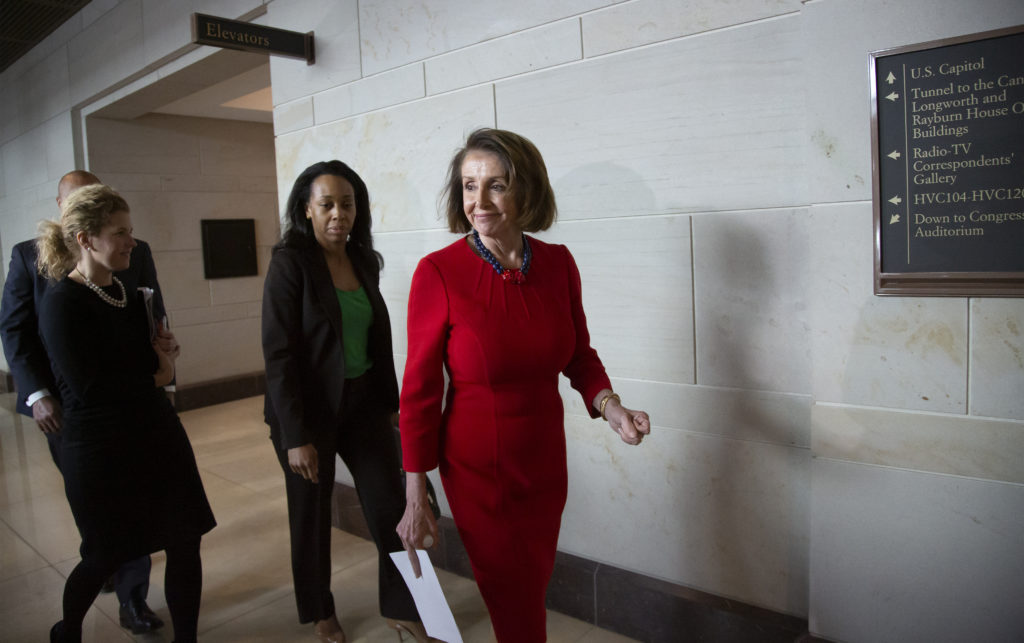
Rep. Nancy Pelosi all but ensured Wednesday that she will become House speaker next month, quelling a revolt by disgruntled younger Democrats by agreeing to limit her tenure to no more than four additional years in the chamber’s top post. Within moments of announcing she would restrict her time in the job, seven of her critics distributed a statement promising to back the California Democrat. Democrats widely agreed that the pledge meant Pelosi had clinched a comeback to the post she held from 2007 until January 2011, the last time her party ran the House and the first time the speaker was a woman. Wednesday’s accord gives Pelosi a clear path to becoming the most powerful Democrat in government and a leading role in confronting President Donald Trump during the upcoming 2020 presidential and congressional campaigns. It moves a 78-year-old white woman to the cusp of steering next year’s diverse crop of House Democrats, with its large number of female, minority and younger members. The agreement also ends what’s been a distracting, harsh leadership fight among Democrats that has been waged since Election Day, when they gained at least 39 seats and grabbed House control for the next Congress. It was their biggest gain of House seats since the 1974 post-Watergate election. Democrats have been hoping to train public attention on their 2019 agenda focusing on health care, jobs and wages, and building infrastructure projects. They also envision investigations of Trump, his 2016 presidential campaign and his administration. To line up support, Pelosi initially resorted to full-court lobbying by congressional allies, outside Democratic luminaries, and liberal and labor organizations. She cut deals with individual lawmakers for committee assignments and roles leading legislative efforts. But in the end, she had to make concessions about her tenure to make sure she’ll win a majority — likely 218 votes — when the new House convenes Jan. 3. Democrats are likely to have 235 seats, meaning she could spare only 17 defections and still prevail if, as expected, Republicans all oppose her. Pelosi had described herself as a transitional leader over the last several weeks. But she’d resisted defining how long she would serve as speaker, saying it would lessen her negotiating leverage to declare herself a lame duck. On Wednesday, she gave in to her opponents’ demands that she limit her service. Under the deal, House Democrats will vote by Feb. 15 to change party rules to limit their top three leaders to no more than four two-year terms, including time they’ve already spent in those jobs. “I am comfortable with the proposal and it is my intention to abide by it whether it passes or not,” Pelosi said in her statement. Pelosi’s opponents have argued it was time for younger leaders to command the party. They also said her demonization as an out-of-touch radical in tens of millions of dollars’ worth of Republican television ads was costing Democrats seats. While some Democrats are still certain to vote against Pelosi — especially incoming freshmen who promised to do so during their campaigns — most Democrats have remained solidly behind her. She’s been a strong fundraiser and unrelenting liberal who doesn’t shy from political combat, and her backers complained that her opponents were mostly white men who were largely more moderate than most House Democrats. Pressure to back Pelosi seemed to grow after she calmly went toe-to-toe with Trump at a nationally televised verbal brawl in the Oval Office on Tuesday over his demands for congressional approval of $5 billion for his proposed border wall with Mexico. “We are proud that our agreement will make lasting institutional change that will strengthen our caucus and will help develop the next generation of Democratic leaders,” the rebellious lawmakers said in a written statement. To be nominated to a fourth term under the agreement, Pelosi would need to garner a two-thirds majority of House Democrats. Several aides said they believed restlessness by younger members to move up in leadership would make that difficult for her to achieve. The limits would also apply to Pelosi’s top lieutenants, No. 2 leader Steny Hoyer of Maryland and No. 3 leader James Clyburn of South Carolina. Both are also in their late 70s. Rep. Ed Perlmutter, D-Colo., was among 16 Democrats who had signed a letter demanding new leadership but who ultimately helped negotiate the deal with Pelosi. Joining Perlmutter in saying they would now back her were Democratic Reps. Seth Moulton of Massachusetts; Tim Ryan of Ohio; Bill Foster of Illinois; Linda Sanchez and Rep.-elect Gil Cisernos, both of California; and Filemon Vela of Texas. Republished with permission from the Associated Press.
Democrats focus on voting rights ahead of 2020 primary
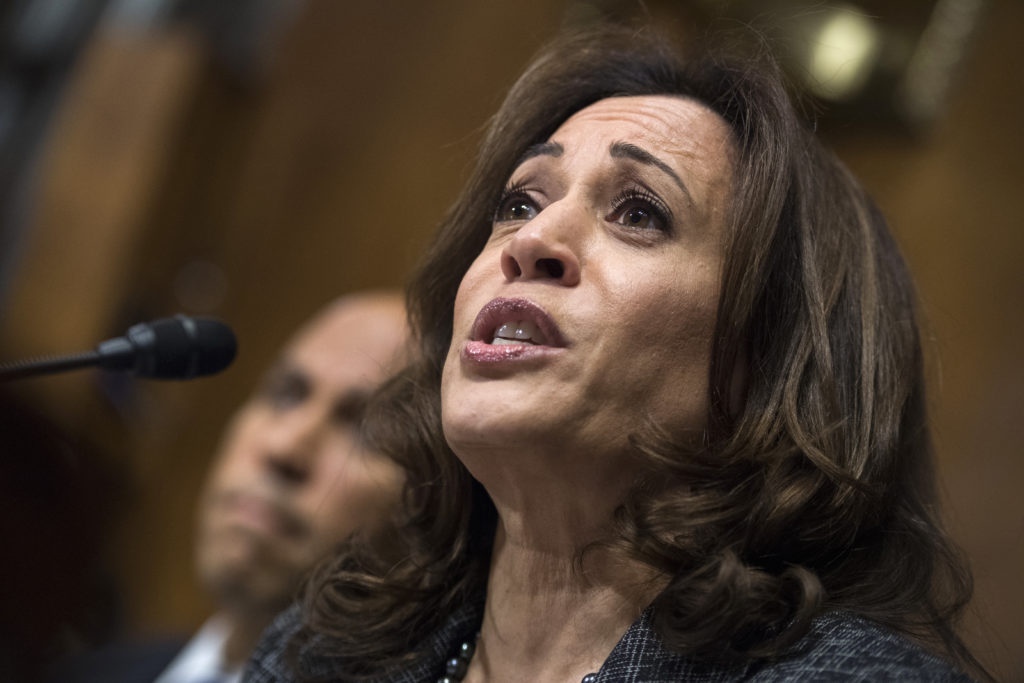
Democrats are trying to turn their most painful losses this year into a rallying cry they hope will electrify the 2020 presidential campaign: Every vote matters. Multiple potential contenders for the Democratic presidential nomination are elevating the issue of voting rights as they prepare to launch campaigns. They’re vowing to oppose Republican-backed efforts to require identification to vote, reinstate protections eliminated by a 2013 Supreme Court ruling and frequently highlight the necessity of counting every vote. The aim is to tap into the anger and frustration among Democrats who argue that Republicans win some elections by making it harder for their constituents, particularly minorities, to vote. That sentiment has long existed among Democrats but intensified after the party lost closely watched races for governor in Georgia and Florida last month. Both contests featured heated racial rhetoric and charges of voter suppression. The party’s suspicion of Republicans has also grown as a congressional race in North Carolina remains mired in allegations of absentee ballot fraud and GOP lawmakers in Wisconsin and Michigan seek to weaken the power of incoming Democratic governors. Democrats ultimately hope to turn the issue of voting rights into an argument that’s just as persuasive to voters in 2020 as health care proved to be in 2018. And there’s already competition among potential presidential contenders to build a reputation as the most aggressive in advocating for the right to vote. “This is not a new issue, and it is quite frankly the dark history of our country, which is specific populations being restricted from meaningful access to the right to vote,” Sen. Kamala Harris of California told The Associated Press. “There’s no question that 2018 highlighted an issue that has maybe seemed to be dormant for some time, but it’s very much alive and it should be the subject of dinner table conversations everywhere and it should be of real concern to everyone because, look, when people lose confidence in our democracy, when Americans lose confidence in our democracy, it will impair our strength. It will cause us to be weaker,” she said. Aides to Harris said that voting rights would be among her top priorities, and that she would likely frame it less as a civil rights issue and as more of a broader Democratic rallying point. She has argued that the entire Democratic agenda is weakened when Republicans restrict ballot access for unions, minorities and other groups. New Jersey Sen. Cory Booker, who is weighing his own presidential bid, has framed the issue of voting rights in the context of a traditional civil rights issue. During an October trip to Des Moines, Iowa, Booker sparked cheering standing ovations as he quoted from Martin Luther King Jr.‘s speech from the 1965 voting rights march on Montgomery, Alabama. “How long will it take? I’m going to tell you, not long now,” Booker proclaimed, turning the moment into a call-and-response. “Because it’s not long until November.” Harris, Booker and Sen. Amy Klobuchar of Minnesota are among the potential presidential candidates who will hold onto seats on the Senate Judiciary Committee heading into 2020, giving them an important post from which to address voting rights. That’s leaving some activists pleased that the issue appears to be moving into the mainstream of Democratic politics. “This is the first time where I feel like there has been a broad conversation because the examples were so egregious,” said Adrianne Shropshire, the executive director of BlackPAC, which works to mobilize black voters. “It was literally in every community that I went to, in every church that I stopped by, in every neighborhood when I was knocking on doors — that was almost one of the first things that people were talking about because everyone felt like their community was under assault.” Still, some caution that the focus on voting rights isn’t a successful strategy to win a crucial election and could instead backfire on Democrats who are trying to appeal to broader swaths of voters. Peter Guzman, a Republican who is the president of the Latin Chamber of Commerce in Nevada, said that while he feels every candidate — Democrat and Republican — should talk about voting rights, he didn’t see it as a singularly important issue to center a campaign on. “I think the conversation should be encouraging everybody to vote, and if anybody feels like that’s being suppressed, they certainly should call the authorities and make it known that they’re not able to vote,” Guzman said in an interview. He added that he could see potential backlash for a candidate who campaigns on it. “I’m not quite sure everybody in the country believes the problem is that significant,” he said. “Here in Nevada, I believe that we have some of the best, safest voting in the United States,” he added. “I think we’re a model for the rest of the nation. I do not believe that there’s voter suppression. Whenever I hear voter fraud, I believe those are buzzwords for other things.” That’s not stopping Democrats for now. At a post-election gathering on Capitol Hill of the National Action Network, the civil rights organization founded by the Rev. Al Sharpton, multiple senators who appear to be moving toward jumping into the 2020 presidential race eagerly discussed the issue. “When it comes to elections, there should be no hesitation: Every vote matters, period,” said Sen. Elizabeth Warren of Massachusetts. “If you can’t get more Americans to vote for you than the other guy or gal, then you lose. It’s that simple. Politicians are supposed to compete over how many voters they can persuade to come vote for them, not how many American citizens they can disqualify, discourage or demoralize.” Klobuchar, who could stake out a more moderate position among Democrats should she choose to seek the White House, told the gathering, “I think No. 1 on the agenda has got to be our economy.” “And then,” she continued, “you can’t have a fair economy for everyone if you don’t have fair voting rights.”
Looking ahead, Democrats jockey to be Nancy Pelosi’s heir apparent
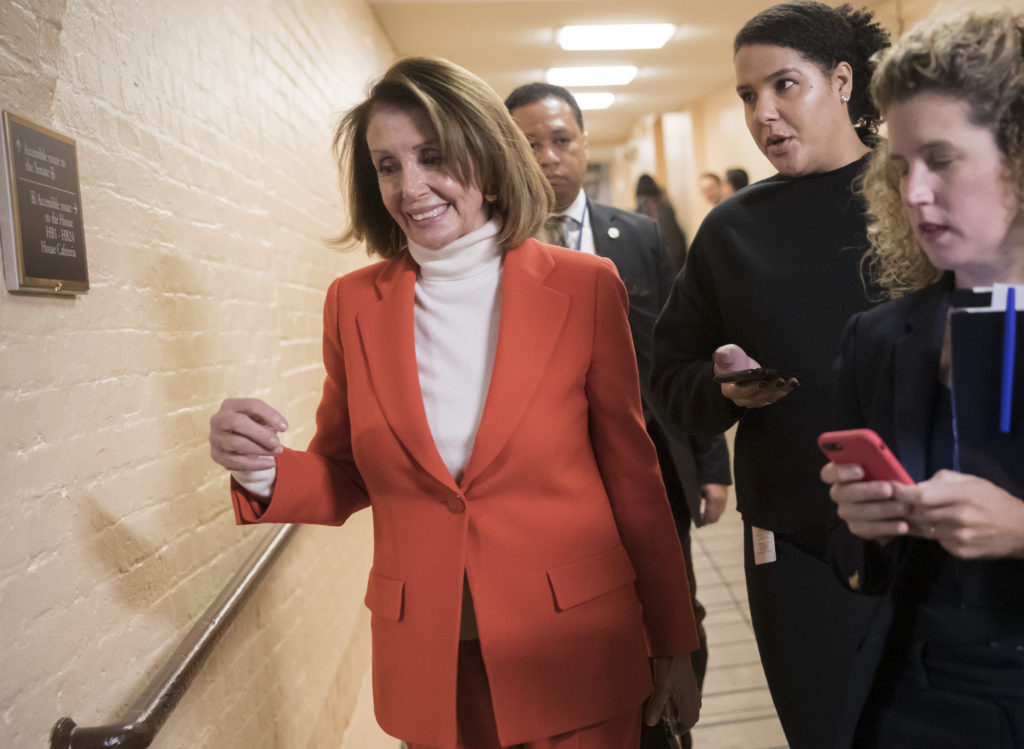
As Nancy Pelosi moves closer to securing the votes to become House speaker, the stage is being set down-ballot for the next generation of leaders jockeying to be the Democrats’ heirs apparent. Pelosi’s return to the speaker’s office is not a lock. One more newly-elected Democrat, Gil Cisneros of California, announced Monday he was adding his name to those vowing to vote for new leadership. Yet even as Pelosi faces persistent opposition, her opponents have suffered a string of setbacks. Pelosi turned one would-be challenger into a supporter by doling out a subcommittee gavel and flipped other opponents to the yes column with commitments to address their legislative priorities. With Cisneros, the group now has 16 names on a letter seeking new leadership, almost as many as when it started after the midterm election. Rep. Seth Moulton, D-Mass., an organizer of the effort against Pelosi, said Monday he never intended to target just her, but wants a clean sweep of the top three Democratic leaders. In a statement, Moulton said he is seeking “a serious conversation about promoting leaders who reflect the future.” He and Pelosi have not yet talked. “This is so much bigger than her,” Moulton said. “It’s about the entire, stagnant, three-person leadership team.” Separately, nine Democrats in the Problem Solvers Caucus say they’ll only support a speaker who agrees with rules changes to open the process for moving legislation. Rep. Josh Gottheimer, D-N.J., said Monday he had a “constructive” conversation with Pelosi over the holiday break and he hopes she gets “on board.” Some of those who signed the letter from Moulton’s effort may be willing to reach a deal that would guarantee a fresh round of leadership elections a year from now, earlier than the typical two-year term, according to an aide close to the group. That seems unlikely. The No. 2 and No. 3 Democrats — Rep. Steny Hoyer of Maryland, who would be majority leader in the new House, and Rep. Jim Clyburn of South Carolina, who would be whip — have all but locked up the votes and are running unopposed. And Pelosi has indicated that while she doesn’t plan to keep her hold on power forever — she calls her bid a transition to the new generation — she’s also shown no interest in making herself a lame-duck leader. As House Democrats meet behind closed doors Wednesday to start voting, it seems increasingly likely that Pelosi’s team will emerge intact. And that’s causing much maneuvering, as up-and-comers position themselves to be next in line once Pelosi’s generation eventually steps down. Notably, virtually none of them is clamoring against Pelosi. At the forefront is Rep. Ben Ray Lujan, the low-key New Mexico Democrat who helped usher in the majority as chairman of House Democrats’ campaign committee. He is running unopposed for the No. 4 job as assistant Democratic leader. Others are staking their claims on lower rungs: Rep. Hakeem Jeffries of New York is running for caucus chair against veteran Rep. Barbara Lee of California; they are both prominent members of the Black Caucus. Rhode Island Rep. David Cicilline wants to helm policy and communications. Rep. Cheri Bustos, from an Illinois district that supported President Donald Trump, is aiming for campaign chief against several others. Even farther down the ladder are another half dozen Democrats competing for vice chair of the caucus or positions on the expanded policy and communications committee. They’re largely concentrating on their own races, which will be determined Wednesday. The speaker’s contest won’t be settled until the full House votes in January. Republished with permission from the Associated Press.
2020 Democratic contenders already eyeing top staff in Iowa
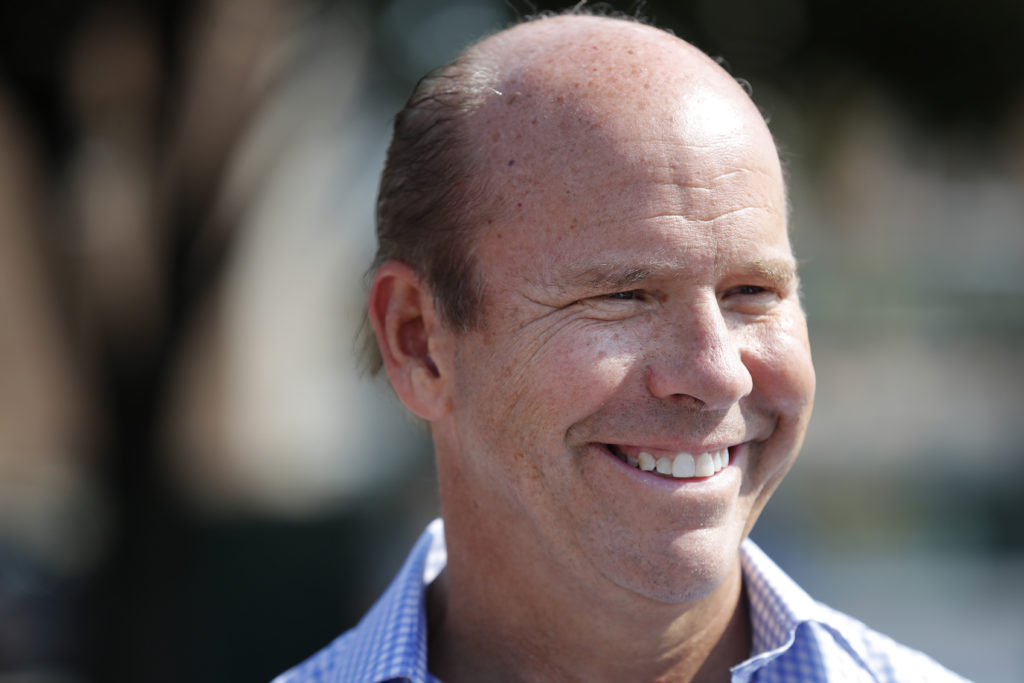
Andrew Turner was driving Iowa’s Democratic candidate for state auditor back to Des Moines last month when a potential presidential contender called to make an introduction. It was one of many such overtures the 23-year-old has fielded. “I’m hearing from them,” said Turner, who managed Rob Sand‘s winning campaign for auditor. “They’ve been pretty respectful, congratulating me, but saying we’d love to talk to you more.” The 2018 midterms are barely history, but the next campaign is already in full swing in Iowa, home to the first caucus of the 2020 Democratic presidential nominating campaign. In the two weeks since the election, potential White House contenders have intensified their effort to recruit operatives who could help them navigate an Iowa campaign. In a state that hasn’t had a wide-open campaign in more than a decade, recent Iowa success is a hot commodity. The competition is shaping up to be especially fierce because the field could include as many as two dozen candidates. “There are going to be so many candidates, the Iowa staff primary is more important this cycle than perhaps any other cycle on the Democratic side,” said Jennifer Palmieri, a former top aide to Hillary Clinton‘s 2016 campaign. The outreach ranges from friendly encouragement to all-out wooing. Sen. Cory Booker of New Jersey has been especially aggressive in reaching out to potential staffers, according to multiple who have spoken to him. That is in keeping with other early moves that suggest he would make a strong play in Iowa should he launch a campaign. He made an impression among some potential surrogates by calling more than a half dozen Democrats who ran for statewide office the day after the election. Sen. Kamala Harris of California and former Massachusetts Gov. Deval Patrick also have been in touch with top potential staffers and party organizers. Lesser-known Maryland Rep. John Delaney, who is banking on a strong Iowa finish to vault him into contention, already has 10 staff in Iowa, with plans to have 30 scattered across eight field offices by January. “It’s going to be difficult to find qualified staff with as many candidates in the race,” said Monica Biddix, Delaney’s spokeswoman. “That’s why we want to get in there early and expand our footprint now.” Meanwhile, other emerging Democrats are just starting to make Iowa contacts. Colorado Sen. Michael Bennet, a relatively new name to the 2020 discussion, has been in contact with some influential Iowa Democrats, while New York Gov. Andrew Cuomo, who won re-election to a third term this month, has contacted Des Moines-area Democrats. Many of the top staff prospects have key things in common: Youth, familiarity with presidential campaigns and a fresh understanding of Iowa’s Democratic politics. Turner worked on Martin O’Malley‘s 2016 presidential campaign and represents a class of young operatives eager to put their time learning the political nuances of Iowa’s 99 counties to use on politics’ largest stage. Kane Miller managed a winning House race in northeast Iowa this year. He worked for Clinton’s 2016 caucus campaign and has been courted, particularly by Harris. Another prized recruit could be Janice Rottenberg, an Ohio organizer for Clinton in 2016 who ran the Iowa Democratic Party’s campaign that helped all party candidates this year. There’s also Joe O’Hern, a native Iowan and 2016 O’Malley staffer in Iowa who ran Ohio’s statewide Democratic campaign this year and would be considered a likely pick for Ohio Sen. Sherrod Brown if he decides to launch a 2020 candidacy. Outreach to these and other 30-and-younger operatives who are fresh off the midterms and familiar with the caucuses’ nuances suggests those who know the players and the game have the edge. Unlike a primary election, the caucuses are political meetings held statewide where registered Democrats gather to publicly declare their preference for a candidate. It requires a degree of specific logistical organizing more precise than a primary. “People who can adapt and adopt are the people you want,” said Anita Dunn, a former adviser to Barack Obama. “It means landing people who are current.” Republished with permission from the Associated Press.
Election reignites calls for change at Democratic Party
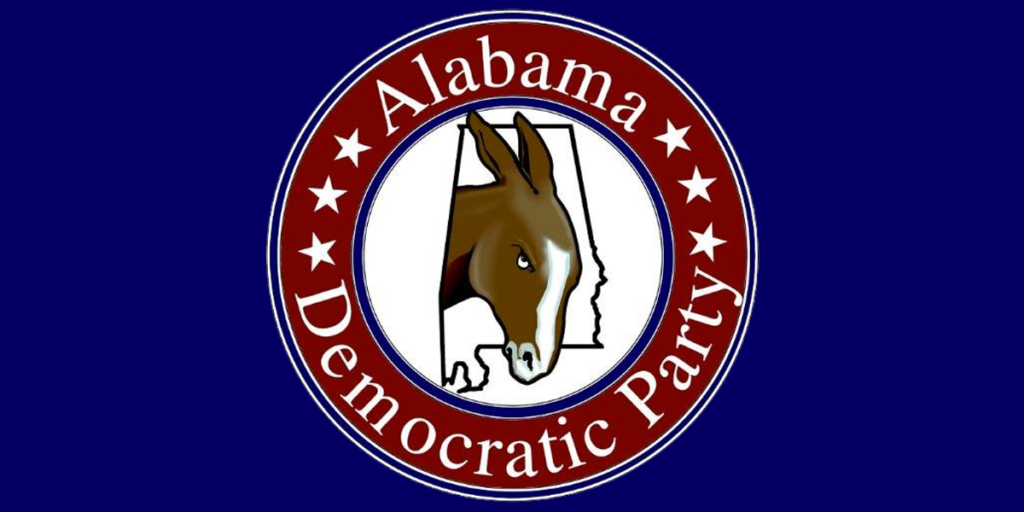
Alabama Democrats’ disappointing performance in Tuesday’s election has reignited calls for changes within the state party, with critics saying candidates were largely left to fend for themselves despite available party funds. Democratic candidates were generally held to about 40 percent of the vote in statewide races, crushing hopes that the party could build on last year’s election of U.S. Sen. Doug Jones, or at least demonstrate themselves as viable with competitive races. The losses rekindled long simmering tensions, with several 2018 candidates calling for new leadership or at least a new approach. “When you have a losing season and a losing season and a losing season, the coach goes,” said former Alabama Chief Justice Sue Bell Cobb, who ran in the Democratic gubernatorial primary. Cobb earlier this year called for the resignations of Alabama Democratic Party Chair Nancy Worley and Vice-Chairman Joe Reed. Mallory Hagan, a former news anchor and Miss America who ran in Alabama’s 3rd Congressional District, used her election night speech to say that Democrats upset over the loss should be “mad at our own” party. Chief Justice candidate Bob Vance stopped short of calling for a change in leadership but he said the party needs a “new approach” and said promises of help never substantially materialized. The Democratic Party, which has been silent for months at a time on social media, has been criticized for not being an active presence to promote the Democratic brand and candidates. The party had about $800,000 combined in its state and federal accounts that it did not exhaust on efforts to back candidates. “That’s the burr under my saddle that the party had the capability and chose not to do anything with it,” Vance said. Worley defended the party’s efforts and spending decisions. She said the party did have more money from qualifying fees this year, but had to hold money back for operating expenses, to pay debt and because of restrictions on how funds can be used. Worley estimated the party spent about $250,000 on efforts for candidates, including fliers that pictured all the statewide candidates, and five days of radio and TV ads urging people to vote Democratic. “Pointing the finger of blame at any single person after an election in just using the scapegoat method,” Worley said There are two separate petitions with the Democratic National Committee that were filed before Tuesday contesting Worley’s August election as chairwoman. One of the petitions alleges that “elections were conducted in a sloppy and haphazard manner” and “deliberately manipulated” in order to favor Worley and others. Worley said that they will file a response to those complaints. Democrats in Alabama had been obliterated from statewide office — until Jones’ election last year. Sheila Gilbert, chairwoman of the Alabama Democratic Reform Caucus, said while state candidates had a 20-point deficit there were some close legislative races that she believed could have benefited from state party help. Many veteran candidates had been modest in their expectations for Tuesday, not expecting a blue wave, but perhaps a blue ripple or at least slimmer margins in state races. “I’m not sure that we could have moved the needle much, even if we had brought all these forces to bear, but certainly the absence of a meaningful party, not just for this election cycle, but for years now, I think has contributed to these problems which really became evident this last Tuesday,” Vance said. Republished with permission from the Associated Press.
Democrats eye Donald Trump’s tax returns but expect a long fight
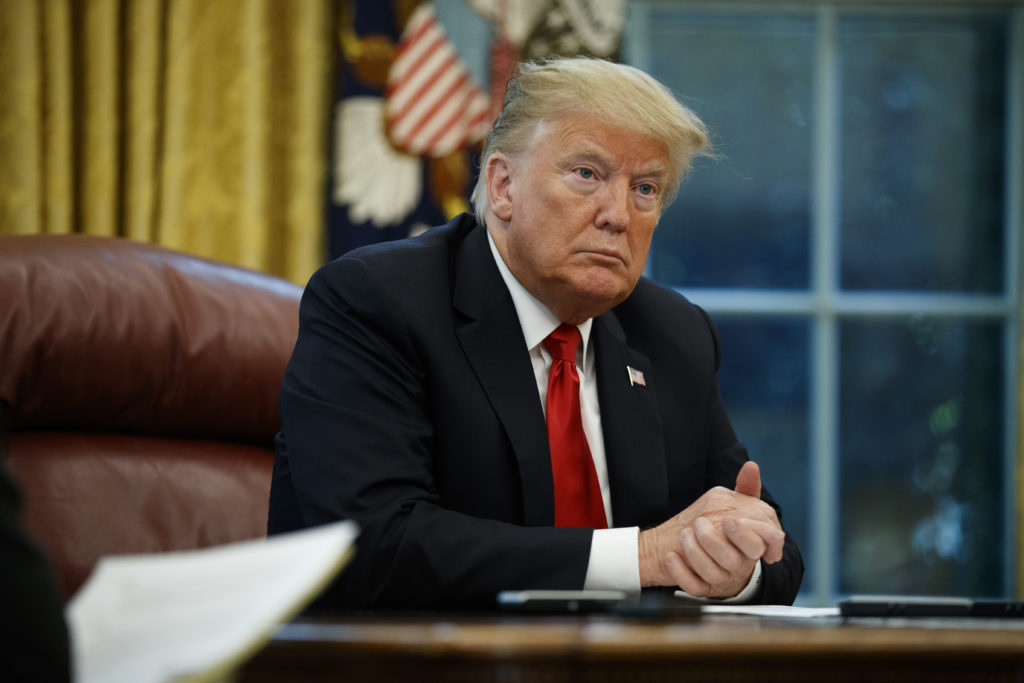
Getting President Donald Trump‘s tax returns is high on the list of Democratic priorities now that they have won the House. By law, the leaders of tax-writing committees in the House and Senate can obtain tax returns and related information from the Internal Revenue Service. Democrats will control the House panel next year. Yet there’s no guarantee that the Trump administration will provide the president’s returns. That sets up the possibility of a legal battle over the request that could take years to resolve. Trump broke with political tradition in 2016 by refusing to release his income tax filings. He says he won’t release them because he’s under audit, and he claimed at a press conference this week that the filings are too complex for people to understand. The Democrats tried and failed several times to obtain Trump’s returns as the minority party in Congress. Now, having gained some control, they see them within their grasp. Eyes are on Rep. Richard Neal of Massachusetts, who is now the senior Democrat on the powerful Ways and Means Committee and will become its chairman in January. When asked Wednesday whether the committee under his control would ask for the documents, Neal said, “Yes, I think we will.” If the Trump administration refuses and mounts a legal challenge, Neal said, “Then I assume that there would be a court case that would go on for a period of time.” A legal fight could potentially even stretch beyond the 2020 presidential election, suggested Andy Grewal, a professor at the University of Iowa College of Law. Grewal has maintained that a request for Trump’s returns, if made for “purely political purposes,” may exceed the limits of Congress’ authority. Starting with the 2016 campaign, Trump broke with political tradition by repeatedly refusing to release his income tax filings. Those filings are deemed sacredly secret for citizens, but traditionally not for presidents. Trump has said he hasn’t released them because his taxes are under audit by the IRS — even though experts and IRS officials say such audits don’t bar taxpayers from releasing their returns. Asked about releasing his filings, Trump reaffirmed that justification during a post-election news conference Wednesday. “They’re under audit. They have been for a long time,” the president said. “They’re extremely complex. People wouldn’t understand them.” Giving a slight opening, Trump said that if the audit was completed, “I would have an open mind to it. I would say that.” But, he added, “Nobody turns over a return when it’s under audit.” In 2017, more than a million people signed a petition to the White House urging Trump to make the returns public. Questions loom: Was the swaggering longtime businessman and real estate mogul really worth $10 billion when he entered the White House, as he has claimed? Are there conflicts of interest lurking? How has his global panoply of properties and other assets been valued for taxation purposes? What are the sources of his income and to whom might he be beholden as a result? Does Trump stand to gain personally from the sweeping Republican tax law enacted late last year, which he championed, and, if so, how specifically? Among the sought-after details: Trump’s charitable giving, the type of deductions he claimed, how much he earned from his assets and what strategies he deployed to reduce his tax bill. House Democratic leader Nancy Pelosi declined during a press conference Wednesday to specifically address the question of Trump’s returns, saying only that Congress has “a constitutional responsibility to have oversight” and citing examples such as the government’s environmental policy that would be ripe for Congress to investigate. The high interest — Democrats would say the urgency — in lifting the veil on Trump’s taxes ramped up last month when The New York Times published an extensive report suggesting that the Trump family cheated the IRS for decades, undervaluing reported assets and using dubious tax maneuvers and outright fraud in some cases. A lawyer for Trump disputed the Times’ findings of possible tax fraud or evasion and said that parts of the report were “extremely inaccurate.” The newspaper said its report was based on more than 100,000 pages of financial documents, including confidential tax returns from Trump’s father and his companies. That could spur the Democrats on the Ways and Means Committee to ask for Trump’s returns going back many years. By law, the chairmen of the House panel, the Senate Finance Committee and the Joint Committee on Taxation can make a written request for any tax returns to the Treasury Secretary, who oversees the IRS. The law says the Treasury chief “shall furnish” the requested information to the members of the committee for them to examine behind closed doors. The IRS, with custody of Trump’s returns, has been headed since Oct. 1 by a commissioner who worked as a private tax attorney for nearly four decades representing individuals and companies in cases before the agency. During the 2016 campaign, the commissioner, Charles Rettig, defended Trump’s refusal to release his filings. He promised at his Senate confirmation hearing to uphold the IRS’ political independence from the White House. Treasury Secretary Steven Mnuchin “will review any request with the Treasury general counsel for legality,” the department said in a statement Thursday. Trump’s attorney Rudy Giuliani has said the Democrats could have a hard time proving their demand was intended for pursuing legitimate congressional oversight, not a political scavenger hunt. If the administration refuses to hand over the returns, the Democrat-led committee might punch back with subpoenas, move to hold officials in contempt of Congress or sue the administration. There’s no roadmap or historical precedent for the situation. Some observers anticipate that the Trump Justice Department would file a lawsuit against the House to block release of the returns. In that case, the administration might try to prove that the Democrats’ demand was politically motivated, as Giuliani indicated. The University of Iowa’s Grewal is among the experts who believe the administration may seek to make
Democrats’ not-so-secret plan to fight midterm malaise
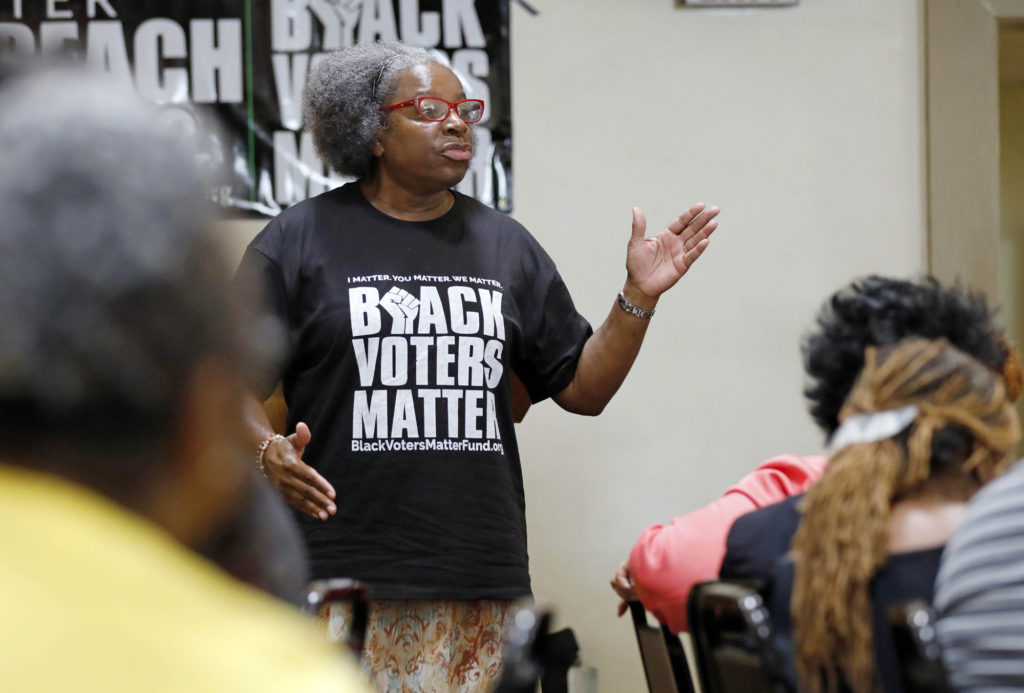
They’re asking pastors to text their congregants about the importance of voting. They’re connecting with thousands of Puerto Ricans displaced by Hurricane Maria. And they’re relying on groups like the NAACP, which has tripled its spending from 2016 to energize black voters. Less than three weeks before Election Day, Democrats are sparing nothing to make sure their voters head to the polls. It’s all part of an effort to avoid the disappointment of previous elections when low turnout dashed high expectations. “2016 was a low point for a lot of us,” said Jamal Watkins, vice president of engagement at the NAACP. “People have awakened and said, ‘Wait a minute, we can’t lose, and we can’t lose like this.’ Folks are fired up to reinvest in turnout.” Younger voters and voters of color tend to stay home in non-presidential elections, making the midterm electorate older, whiter and more Republican-tilting. But that could change this year, Democrats and outside groups say, if unprecedented efforts to reach so-called infrequent voters galvanize people who previously sat on the sidelines. Democrats have reason for optimism: The party saw strong turnout in nearly a dozen federal special elections ahead of the midterms, with Democratic candidates consistently outperforming Republicans. But the organizing flurry comes amid concerns over ballot access and election security, which have become a flashpoint in the high-profile gubernatorial race in Georgia. There is also mounting anxiety about whether efforts to mobilize Latino voters will translate into votes, particularly in several key races in heavily Latino districts. The party is spending big to ward against such threats. The Democratic Congressional Campaign Committee, the party’s arm focused on House races, is spending more than $25 million in 45 battleground districts to mobilize female voters, millennials, African-Americans and Hispanics, officials said. That’s a far more significant investment than past cycles. The committee is putting an emphasis on turning out African-American women, including running advertising focused on black women ages 18-39 in more than 40 districts. The DCCC has also run Spanish-language TV and radio ads across the country. Between field efforts and paid media, voters of color in targeted swing districts will have heard from the DCCC more than 100 times in the closing 60 days of the election. And in a twist, some of the outreach this year will be facilitated by local community leaders instead of anonymous politicos. “As an example of the local voter contact and text messaging program that we are doing, we are partnering with a series of pastors and local validators across the country,” said DCCC Executive Director Dan Sena. “When you’re getting a text message saying ‘hey – early vote’s starting,’ you’re not getting it from someone in Washington D.C. You’re actually getting it from somebody in Georgia that has a big delegation, or you’re getting it from someone on campus that you know.” The Democratic National Committee also beefed up its voter database, purchasing 94 million cellphone numbers, according to a DNC official who spoke on the condition of anonymity to discuss internal strategy. The official said the additional cell phone numbers have helped with voter contact in key races across the country, including encouraging sporadic voters to participate. Republicans say they have their own well-organized, well-funded turnout machine that dwarfs Democrats’ efforts. A Republican National Committee aide said the organization has raised more than $250 million this cycle, invested in 28 states, more than 540 paid staffers and thousands of volunteers who are focused on turning out Republicans who don’t vote often and swing voters who participate more frequently. The committee raised more than $150 million during roughly the same period ahead of the 2014 midterms. The aide said the RNC has made more than 50 million voter contacts, either over the phone or by going door-to-door The Democratic organization effort goes beyond the traditional party structure. NextGen America, the advocacy group backed by billionaire environmentalist and donor Tom Steyer, is injecting more money into a closing push to rally young voters. The group will spend more than $4 million on digital ads across 11 states, targeting more than 4.3 million young voters. NextGen is also running the first political ads on Twitch, a popular video streaming service, as well as places like Reddit, Spotify and Pandora. “Young people in general feel like they’ve really been shut out of the system,” said Aleigha Cavalier, a spokeswoman for NextGen America. “Our goal with digital is to find a message that works for them and actually put it where their eyeballs will see it.” The Human Rights Campaign’s Equality Votes PAC launched a more than $2 million campaign across eight key races spanning digital, direct mail, text and phone voter contact. The NAACP’s campaign is targeting more than 5 million “infrequent” black voters, including in the key states of Florida, Georgia and North Carolina, in a $6 million voter mobilization push, up from $2 million spent on mobilization in 2016. The push includes upward of 20 staffers focused on mobilizing black voters, the majority of those, according to Watkins, working in key states with thousands of on-the-ground volunteers. In Georgia, the organization is targeting more than 700,000 “infrequent” voters. In Florida, the number swells to more than 900,000. The NAACP is not the only group that’s boosting its turnout effort. The AFL-CIO, the nation’s largest labor federation, also shifted its strategy. Julie Greene, who is leading the union’s mobilization efforts, said that in 2014 and 2016, the union experimented with an independent expenditure program that had more of a focus on the general public, rather than the union’s member-to-member program. The union found that its members had not turned out in support of labor-endorsed candidates at the same levels as in the past. The union now hopes to increase turnout among its members by 5 percent, up from 57 percent in 2014. But it is also investing significantly in mobilizing Hispanic and African-American voters. Last week, the union announced plans to air ads on African-American and Spanish-language radio in
2020 Democrats building ties to power brokers in key states
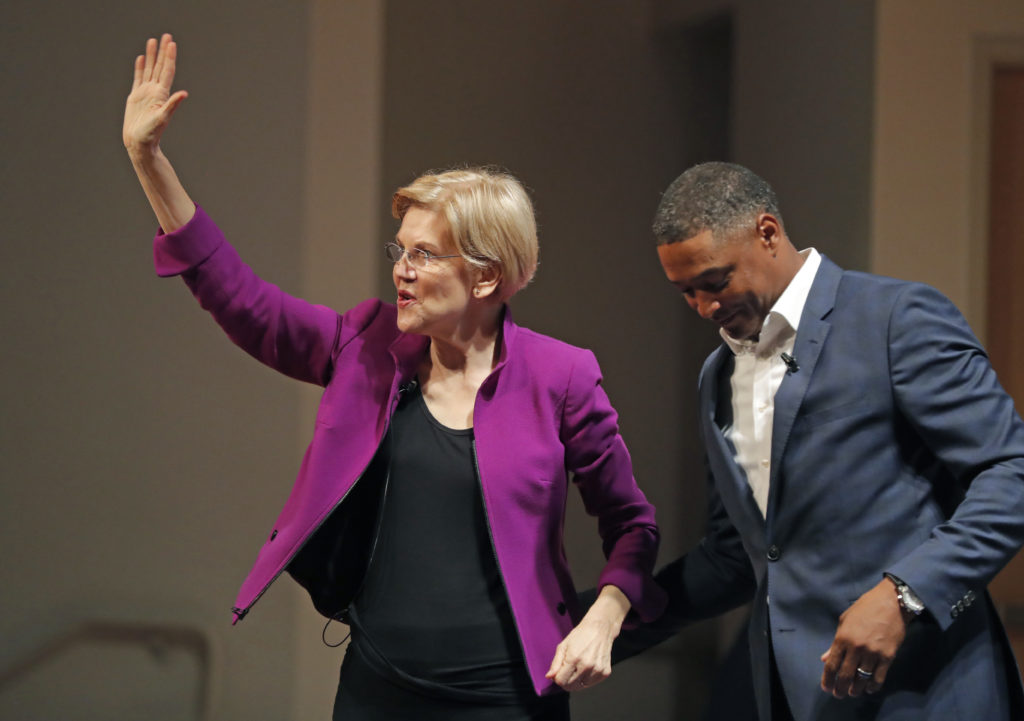
Before he cut the $100,000 checks, Los Angeles Mayor Eric Garcetti brought the Democratic Party chairmen from Iowa, New Hampshire, South Carolina and Nevada backstage to meet late night television host Jimmy Kimmel and superstar hip-hop producer DJ Khaled. Garcetti may not be the best-known 2020 presidential prospect, but he will not be forgotten by those who lead Democratic politics in the states most responsible for picking the party’s next presidential nominee. After the star-studded California fundraiser late last month that featured 10 state-party chairmen, followed by a private dinner, Garcetti issued $100,000 checks to each of their state parties. It was the money, more than the celebrity, that impressed New Hampshire Democratic Party Chairman Ray Buckley. “Obviously, to those who are helpful, we are extraordinarily grateful,” Buckley told The Associated Press. “So many of our states are battling epic elections.” Many of the Democratic Party’s most ambitious have begun building relationships on the ground in the states most responsible for picking the next presidential nominee, although few are doing it as brazenly as the Los Angeles mayor. Most are more quietly endearing themselves to local candidates with phone calls, emails and donations up and down the ballot across Iowa, New Hampshire, South Carolina and Nevada, the states expected to host the first four presidential primary contests in roughly 15 months. The early-state relationships require a delicate balance for those who want to stand out in a crowded field next year without neglecting the high-stakes midterm elections this fall. Control of Congress and state houses across the nation is up for grabs in just three weeks. Sen. Cory Booker of New Jersey has raised more than $7 million and campaigned across 21 states for other Democratic candidates this midterm season, according to an aide. He also attended a family reunion with extended relatives in Iowa last week before and after stumping for dozens of down-ballot candidates for offices like secretary of agriculture and state auditor. Booker, who is openly contemplating a 2020 bid, campaigns for South Carolina Democrats on Thursday. Sen. Elizabeth Warren of Massachusetts is in the midst of her own re-election campaign, as well as a midterm blitz to help other Democrats nationwide win their races. While she has not yet campaigned for Democrats in neighboring New Hampshire, she was among the first elected officials to call gubernatorial candidate Molly Kelly on the night of her primary election victory. Warren has also designated staff to help candidates in the early states, including former staffers now working for state parties in New Hampshire and South Carolina. In Iowa, congressional candidates J.D. Scholten and Cindy Axne got a campaign boost from former Housing Secretary Julian Castro last weekend; Sen. Bernie Sanders of Vermont is expected to rally supporters behind Scholten later this month. Iowa Democrat Deidre DeJear, the party’s nominee for secretary of state, has attracted support from several presidential prospects, none more helpful than California Sen. Kamala Harris. They met in Los Angeles at an April event sponsored by The Links, a service organization dedicated to black professional women. Their bond has grown since. On the day of her June primary, DeJear got a phone call of encouragement from Harris before narrowly winning her race, becoming Iowa’s first black nominee for statewide office from a major political party. The California senator attended a fundraiser for DeJear in Washington and later this month plans to make her first trip to Iowa to rally young voters on DeJear’s behalf. “Having big names in Iowa really can drive people to early vote, drive people to volunteer — it’s just an extra level of excitement,” said Cynthia Sebian-Lander, DeJear’s campaign manager. “What we need to do is use these visits as a way to talk about our down-ballot candidates and the importance of voting in every single race.” Beyond Iowa, Harris has raised more than $1 million over the first 15 days of October to help Democratic candidates, according to an aide. She has traveled to 10 states and plans to travel to South Carolina late this week. Sen. Kirsten Gillibrand of New York, who has spent much of the year working to help elect female candidates across the country, has sent out nine emails to raise money for Nevada Senate candidate Jacky Rosen. Gillibrand took 20 minutes during the recent Supreme Court debate to address Nevada Democrats, via teleconference. “What you’re doing in this campaign could flip the Senate,” the New York Democrat said in a video projected on the wall. “I think that Jacky’s seat is one of the most important, if not the most important seat.” While it may seem early, political veterans note that off-year elections can be critical in the multistage process of running for president. While President Donald Trump ignored laying such groundwork and found success, relationships in the early states are expected to matter — particularly in a field that could attract as many as two dozen candidates. In addition to the young senators, the early prospects range from former Vice President Joe Biden to attorney Michael Avenatti to Washington Gov. Jay Inslee to South Bend, Indiana, Mayor Pete Buttigieg. Garcetti is using his southern California connections to try to separate himself from the pack. Already a frequent visitor to early voting states, he got the idea for a glitzy Los Angeles event after raising $100,000 for the South Carolina Democratic Party. Garcetti ultimately helped raise $1.5 million at the late-September fundraiser in Los Angeles with Kimmel and Khaled that also attracted top California moneymen such as LinkedIn co-founder Reid Hoffman, sports and entertainment executive Casey Wasserman and former Disney Chairman and CEO Michael Eisner. Ten state parties received $100,000 checks, a group that included the early states and Midwestern battlegrounds like Michigan, Minnesota, Ohio, Pennsylvania and Wisconsin. Former South Carolina Democratic Party chairman Jaime Harrison said he’s encouraged to see the energy surrounding the early-state action. “I think this going to be a free for all,” he said. Republished with permission from the Associated
GOP ramps up election-season warning of ‘toxic’ Dem tactics
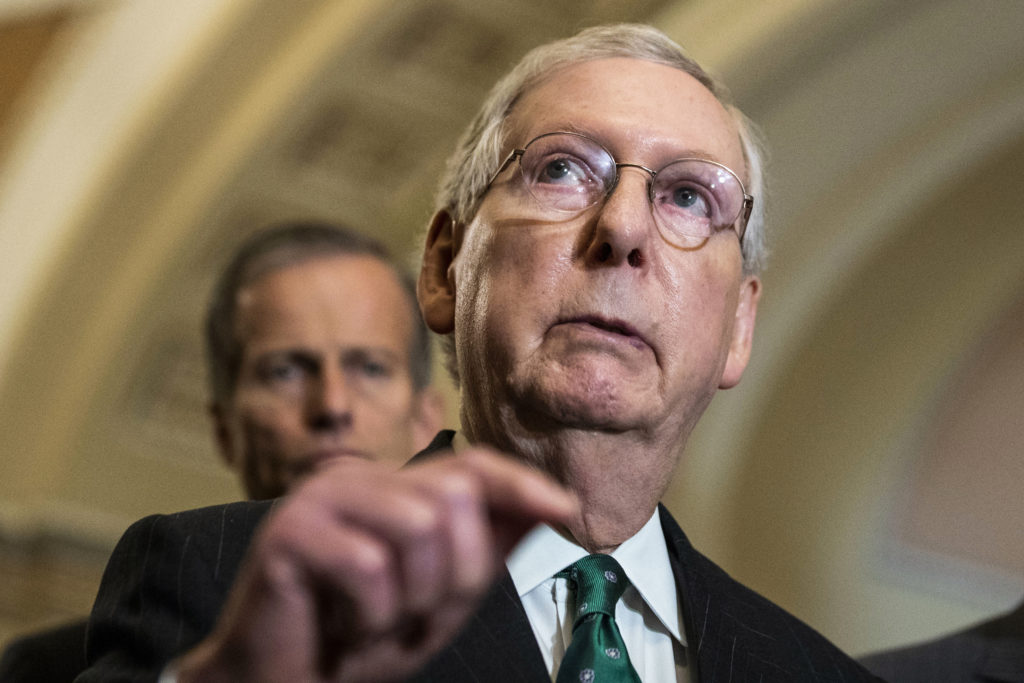
Senate Majority Leader Mitch McConnell bashed Democrats and their liberal allies Thursday for statements and actions that he dubbed “toxic fringe behavior,” sharpening Republicans’ campaign-season rhetoric as the party tries rousing conservative voters to turn out on Election Day. The Kentucky Republican’s remarks on the Senate floor were an extended version of a message party leaders have delivered since last week. That’s when the GOP began accusing Democrats of condoning “mob rule” after raucous demonstrators opposing Brett Kavanaugh‘s Supreme Court nomination harangued GOP lawmakers at the Capitol last week. Some Republicans said they received death threats. McConnell described protesters “literally storming the steps of the Capitol and the Supreme Court,” confronting Republicans at restaurants and shouting from the Senate visitors’ galleries during last week’s debate and vote on Kavanaugh. “Only one side was happy to play host to this toxic fringe behavior,” McConnell said. “Only one side’s leaders are now openly calling for more of it. They haven’t seen enough. They want more. And I’m afraid this is only Phase One of the meltdown.” He added: “We will not let mob behavior drown out all the Americans who want to legitimately participate in the policy-making process.” McConnell’s comments come less than four weeks from elections in which Democrats are seen as having a strong chance at capturing control of the House but weaker odds of winning a majority in the Senate. Until the rancorous debate over Kavanaugh — he denied accusations by three women of 1980s sexual misconduct — polls suggested that GOP supporters were far less motivated to vote than Democrats, who are ardently opposed to President Donald Trump. Republicans have said the rowdy opposition to Kavanaugh has given conservative voters a new enthusiasm. McConnell has called it a political gift. The GOP rhetorical offensive also represents a flipping of the recent script, in which Democrats have accused Trump of intensifying divisions with nationalistic and at times racist appeals to his conservative base and personal attacks on political enemies. Almost a decade ago, Democrats also assailed the Tea Party, grassroots conservatives who rallied against President Barack Obama‘s health care law and who angrily shouted down lawmakers at town hall meetings. On Thursday, McConnell cited recent statements by 2016 Democratic presidential candidate Hillary Clinton and former Attorney General Eric Holder. And he pointedly noted that these activities followed last year’s shooting of GOP lawmakers at a morning baseball practice by “a politically crazed gunman.” James Hodgkinson, who was killed at the scene by officers, was infuriated by President Donald Trump‘s election, his widow has said. Clinton said on CNN this week that “civility can start again” after Democrats capture the House or Senate in next month’s elections. In a video purportedly shot at a recent campaign event in Georgia, Holder says, “When they go low, we kick them,” paraphrasing former first lady Michelle Obama, who famously said during the 2016 campaign, “When they go low, you go high.” Republished with permission from the Associated Press.
Donald Trump trashes Democrats’ Medicare for All plan in op-ed
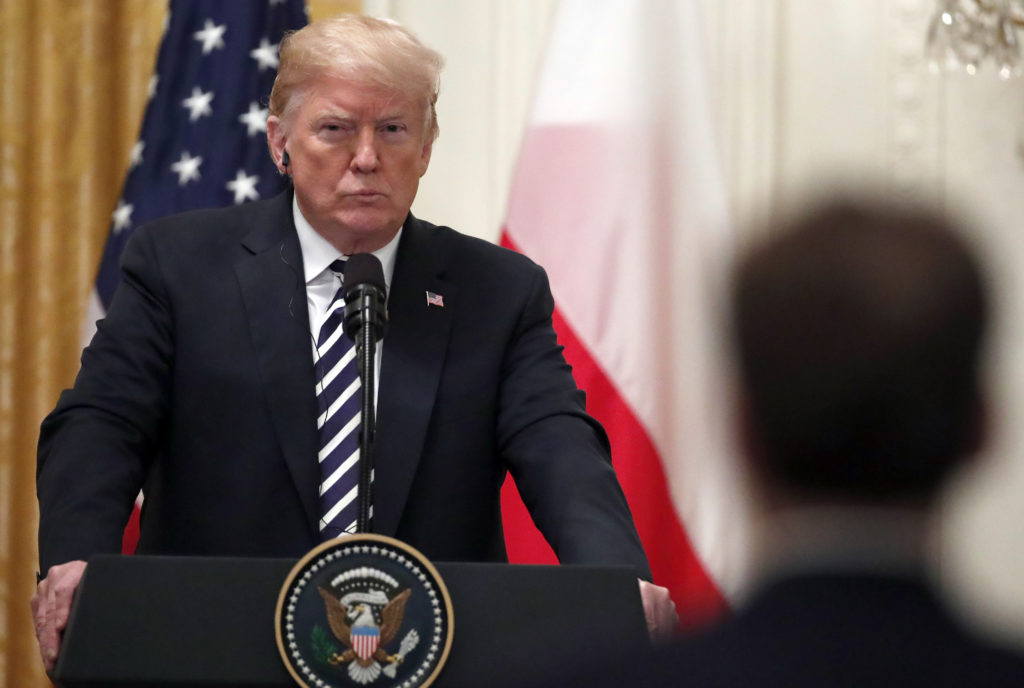
President Donald Trump is stepping up his attack on Democrats over a health care proposal called Medicare for All, claiming it “would end Medicare as we know it and take away benefits that seniors have paid for their entire lives.” Trump, omitting any mention of improved benefits for seniors that Democrats promise, writes in an op-ed published Wednesday in USA Today, “The Democrats’ plan means that after a life of hard work and sacrifice, seniors would no longer be able to depend on the benefits they were promised.” But Medicare for All means different things to different Democrats. The plan pushed by Sen. Bernie Sanders, the Vermont independent who challenged Hillary Clinton for the 2016 Democratic presidential nomination, would expand Medicare to cover almost everyone in the country, and current Medicare recipients would get improved benefits. Other Democratic plans would allow people to buy into a new government system modeled on Medicare, moving toward the goal of coverage for all while leaving private insurance in place. Trump’s column comes as he is looking to paint Democratic candidates as extreme ahead of next month’s midterm elections. A White House official speaking to The Associated Press on the condition of anonymity to describe internal plans said that Trump’s health care attack will be echoed by the Republican National Committee and other GOP groups and that the president will continue to raise the attack during his campaign rallies. Sanders responded Wednesday in a statement, saying Trump “is lying about the Medicare for All proposal” that he introduced. “No, Mr. President. Our proposal would not cut benefits for seniors on Medicare. In fact, we expand benefits,” Sanders said. As Trump escalates his efforts on behalf of fellow Republicans, he is casting health care as one of an expanding list of choices for the electorate this year while seeking to raise the alarm about the consequences of Democratic control of the House or the Senate. Medicare for All, also called single-payer over the years, was until fairly recently outside the mainstream of Democratic politics, but this year it has become a key litmus test in many party primaries and a rallying cry for progressive candidates. Under the plan by Sanders, all Americans would gain access to government insurance with no copays or deductibles for medical services. Republicans contend that the proposal would be cost-prohibitive and argue it marks government overreach. Trump has already sought to paint Democrats as extremists after the bitter confirmation battle over Supreme Court Justice Brett Kavanaugh, and internal GOP polling obtained last month by the AP shows that the party believes the message will help galvanize Republican voters to the polls. At a rally in Iowa on Tuesday, Trump argued that the only reason to vote for Democrats “is if you are tired of winning.” He will be holding a rally in Pennsylvania on Wednesday evening. Republished with permission from the Associated Press.
Senate Democrats: Living out ‘If you give a mouse a cookie’

Since the day President Donald Trump won the election, Democrats have openly flaunted the fact they would do everything they could to derail his presidency, his agenda and essentially anything they could related to him. Chants of “Not my president” could be heard on the streets of D.C. throughout the inauguration and haven’t stopped since. They have shown given any opening whatsoever they will do whatever they can to stop progress and to tarnish anyone associated with the President. Even Senate confirmations for critical agencies have sat around for much longer than in previous administrations. And we’ve watched Trump repeatedly be blamed for policies in existence before he took office. His staff has been accosted out in public. His cabinet officials have been personally and professionally vilified. Everything including his wife’s shoes and recovery time from a medical procedure has come under fire. I thought we’d seen it all until the Brett Kavanaugh confirmation hearings began. When Democrats realized they couldn’t stop the appointment based on his merits, they set out to derail his confirmation by attempting to ruin his character. The twists and turns of the last several weeks are going to have ever lasting consequences as Senator Lindsey Graham passionately said, “This is going to destroy the ability of good people to come forward because of this crap.” The number of holes and inconsistencies in Dr. Christine Blasey Ford‘s accusations from the day they came has out raised red flags for even the most casual observer. That said, Senate Democrats called for another hearing to address the concerns, when they got that they then screamed for an FBI investigation. And then they got that, and now they’re saying that it’s still not enough. They want more time. They want more witnesses. They want more. It reminds me of a book I read to my children, “If you give a mouse a cookie.” The fact is this isn’t about the accusations anymore and if you had any doubt about that Senator Cory Booker was so kind as to finally say so yesterday. Enough already looking at the evidence senators have all that they need to vote plus some. As a voter in Alabama, I call on Senator Doug Jones and the others to reject the partisan gamesmanship that has torn apart more than this nomination process and to confirm Kavanaugh. Top four facts for senators to consider: Not only are there no witnesses, the people Ford claimed were there deny such an event. The holes in Ford’s memory. While not remembering specifics of an event from 35 years ago is in itself surprising the number of holes are in fact. Front door questions. Kavanaugh’s history and testimony and that of those who support him. Senate Democrats have done a great disservice to our nation and to women by using the accusations against Kavanaugh as a prop in their political theater. I hope that the backlash is swift and firm not just with the upcoming elections, but also with Kavanaugh being confirmed.
Barack Obama’s return: good or bad for Democrats?
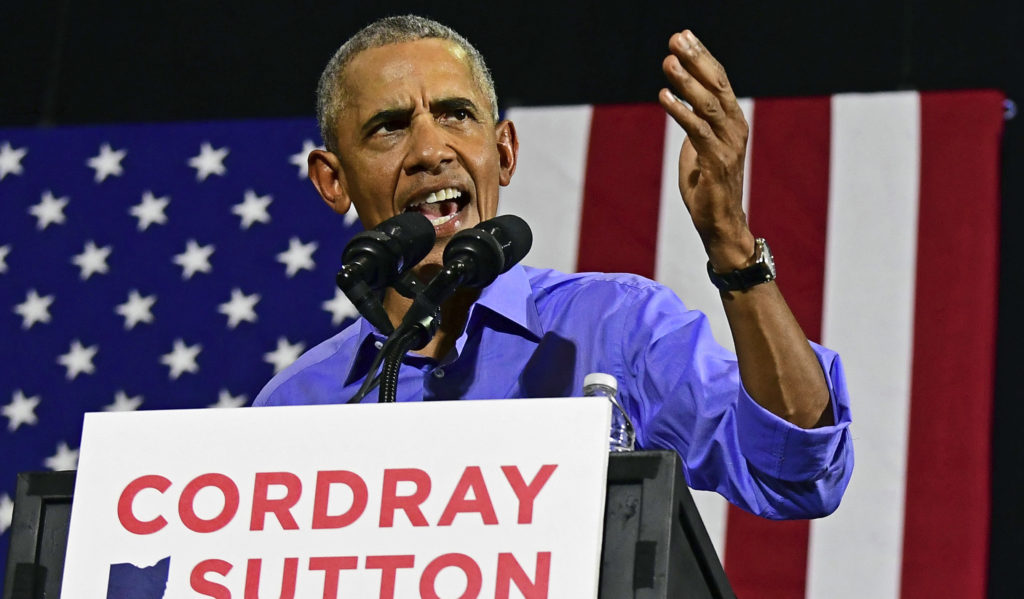
Nearly two years out of the White House, former President Barack Obama is facing another political test. To the delight of many Democrats, he’s stepped back into the fray that former presidents often try to avoid, campaigning for Democratic candidates ahead of the midterms and blasting the political culture of the Trump era. He attracted a large, adoring crowd this past week in Ohio and will be in Pennsylvania on Friday campaigning for Democratic Sen. Bob Casey. But Obama’s return poses challenges for both the former president and his party. For one, Obama has struggled to turn admiration for him into votes when he’s not on the ballot. Democrats lost significant ground in the 2010 and 2014 midterms and his enthusiastic campaigning for Hillary Clinton didn’t carry her across the finish line in 2016. Perhaps more importantly, Obama’s public re-entry into politics could serve as a motivating factor for Republicans, potentially handing the GOP a gift at a time when they face an uphill battle to maintain their grip on Congress. “This is perfect for us,” said Rep. Lou Barletta, the Republican challenging Casey for the Senate seat. “It will energize Republicans as a reminder.” The former president will also “energize those blue-collar Democrats who worried about their jobs under Obama and went out to vote for Donald Trump,” Barletta added. For their part, Democrats say an Obama visit is a huge boon. Massive crowds give candidates and the party a chance to organize, update contact lists, motivate new donors and boost volunteerism. Michael Halle, the campaign manager for Richard Cordray, the Democratic candidate for governor in Ohio, said Obama’s visit sent a message about the stakes of the race, which could have implications for redistricting and voting rights in the future. “First and foremost, it’s important for the people who live in Ohio,” he said. “But secondly, there are also significant national implications, and I think the (former) president weighed those in making the decision.” An aide to the former president said Obama is aware that he does not have a strong record of aiding Democrats in midterm elections and that his presence can have the effect of galvanizing Republican voters. The aide said Obama would take a strategic approach to the midterm races and pointed to the light footprint that the former president kept earlier in his post-presidency. That’s when he recorded a get-out-the-vote robocall for Democrat Doug Jones, rather than travel to Alabama to appear with Jones ahead of his upset Senate victory. The aide cast the decision as an example of how Obama could still lend his voice in a part of the country where he is less popular. The aide lacked authorization to discuss publicly Obama’s thinking and spoke on condition of anonymity. Scott Mulhauser, who served as Vice President Joe Biden‘s deputy chief of staff during the 2012 election, said Obama left office as the “most admired man in the country, and his popularity has only increased since.” “Part of his success is being strategic in his approach to campaigning — coordinating with campaigns to maximize his impact and minimize any blowback, stumping where it makes sense and avoiding where it doesn’t,” Mulhauser said, noting Obama’s role in the Jones campaign. “He’s rightfully out on the trail for certain campaigns, taking a pass on others and recording calls and sending emails on behalf of those that want to use him and his popularity in a targeted manner.” In Pennsylvania, Obama returns to a state he carried twice but that swung to Trump in 2016. The state features critical contests for Congress and governor. Rep. Dwight Evans of Philadelphia, where Obama will campaign, said that the former president’s presence will be important for his ability to motivate African-American voters, college-aged voters and the poor. “I think that he can help Democrats, and I think it needs to be really targeted,” Evans said. Both African-Americans and college-age voters were crucial to Obama’s victories in 2008 and 2012, and because Obama was the first black president, Evans said, “he can say some things to the African-American community that cannot be said by anybody else.” While in Philadelphia, Obama will fundraise for Senate Democrats in general and in particular, Casey, who was among Obama’s earliest Senate backers when he sought the Democratic presidential nomination in 2008. While Obama’s full schedule is taking shape, aides say he is weighing how to best engage on behalf of Democratic candidates across the nation. Earlier this year, he endorsed more than 80 Democrats across more than a dozen states, and aides say a second wave of endorsements is expected this fall. Brenda Boots, 42, who attended the Ohio rally, said Obama is a welcome presence and hoped he would inject the governor’s race with new life. “How could he hurt?” she asked. “I don’t think he could hurt.” Republished with permission from the Associated Press.


